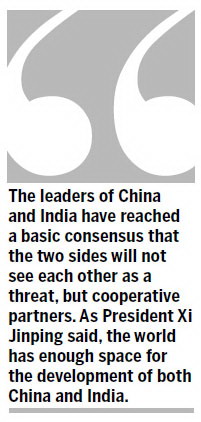Good-neighborly efforts
China and India will enhance political trust, deepen pragmatic cooperation and strengthen people-to-people understanding
Friendly coexistence and closer economic ties are a necessity for China and India. Not just because of geopolitical factors, but, more importantly, because it is also in their fundamental interests and their shared historical mission to boost economic and social development.
The peaceful ending of the recent "tent confrontation" on the Sino-Indian border, the recent visit by Indian Foreign Minister Salman Khurshid to China, and Premier Li Keqiang's visit to India, as the first stop on his first official overseas trip since taking office, signal the two neighbors are committed to forging a long-term friendship, featuring pragmatic cooperation and common development.

China and India are at the same development stage, and both have opportunities for development amid the world's rapid multi-polarization and economic globalization. The two neighbors and peoples are in the same boat and their close cooperation under the framework of BRICS - the grouping of Brazil, Russia, India, China and South Africa - G20 and other mechanisms has attracted worldwide attention and received a warm welcome from developing countries.
Sino-Indian relations have entered a new stage of comprehensive development and the two countries have established a strategic and cooperative partnership for peace and prosperity. The bilateral trade volume has increased nearly 20 fold since the start of the century. China has become India's second-largest trading partner, while India is China's largest trading partner in South Asia. In recent years, trade between China and India has witnessed rapid growth with the bilateral trade volume exceeding $60 billion last year.
China and India are the two largest emerging economies with strong complementary strengths in economic cooperation. China has advantages in manufacturing and infrastructure construction, and it has contracted to build a large number of projects, such as power stations, telecommunications, subways and bridges, in India. India's comparative strengths in information technology, software, outsourcing, biotechnology and pharmaceuticals have great potential in the Chinese market. In addition, China and India can further promote exchanges and cooperation in agriculture, energy, the environment, healthcare, education, media, culture and tourism.
The biggest problem plaguing Sino-Indian relations is the border issue. Fortunately, since the start of this century, both countries have reached a consensus to seek a fair, reasonable and mutually acceptable solution, through equal and friendly consultations. However, it is a complex issue, and it will be difficult to resolve, especially in the spotlight of public nationalism in both countries. Therefore, the final settlement of the issue will require not only sincerity, but also patience. The two sides have agreed to make joint efforts to maintain peace in the border areas and ensure that the boundary issue will not affect bilateral relations.



















